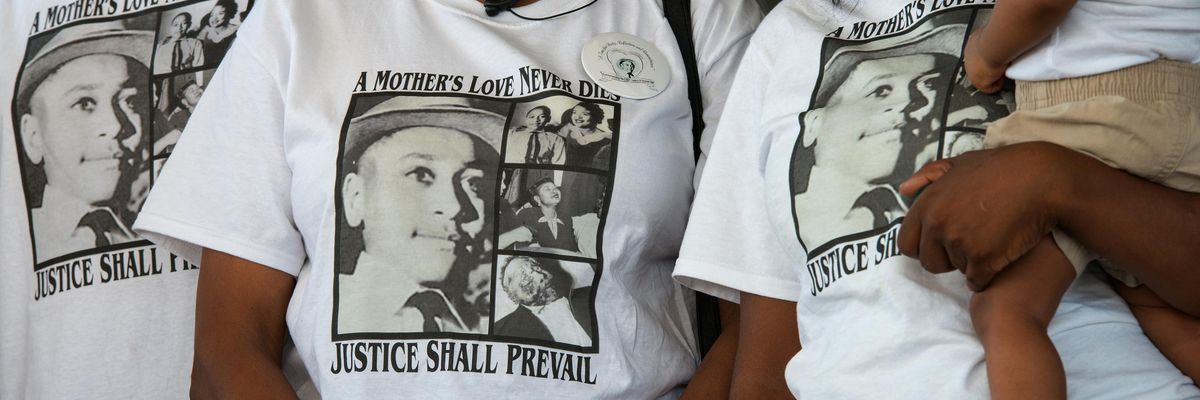If he'd been allowed to live his "one wild and precious life," Sunday would have been the 80th birthday of Emmett Till, who at 14 was kidnapped, whipped, mutilated and murdered by white supremacist thugs in Mississippi in an act so savage it helped spark the civil rights movement. Till grew up in Chicago after his family, like millions of black Americans, left the Jim Crow South as part of the Great Migration. In the summer of 1955, he happily traveled to the Delta to visit relatives; he had just turned 14 and loved to fish, ride bikes, play baseball. After he went with his cousin to buy bubble gum at Bryant's Grocery Store and allegedly, once outside, whistled at the white woman who served him, he was seized in the middle of the night by half-brothers Roy Bryant and J.W. Milam - the woman's husband and brother-in-law - and taken to a barn. Over the next few hours, the two men, likely with several others, beat and tortured him before shooting him in the face. They tied a 75-pound cotton-gin fan around his neck with barbed wire and threw his naked body into the Tallahatchie River. When his corpse was found a few days later, he had a dislodged eye, a detached ear, a broken leg, two broken wrists and a .45 caliber bullet in his skull. After the bloated body was returned to Chicago, his mother Mamie Till-Mobley famously insisted his casket be open for his funeral, because "I just wanted the world to see what they did to my baby." Over 100,000 came to the funeral; many more viewed Till's grisly remains after she allowed Jet Magazine to publish photos. Three months after he was pulled from the river, Rosa Parks refused to move to the back of the bus - she said she was thinking of Till - and the seminal Montgomery Bus Boycott began. Today, Till's casket lies in D.C's National Museum of African American History and Culture, the only object in the museum that no one is allowed to photograph.
After a five-day trial before an all-white, all-male jury urged by the defense to do their duty as "Anglo-Saxons," Bryant and Milam were acquitted. The next year, they got paid $4,000 for an interview in Look magazine in which they confessed to the murder; in 2017, his accuser Carolyn Bryant admitted she'd lied. Today, white kids in Mississippi schools can grow up rarely if ever hearing Till's name, especially if they attend the private "seg academies" that arose after integration. "Slipping free of the generational guilt and shame of this particular murder - a proxy for so many acts of violence and cruelty, large and small - remains a central part of a white child's education in the Delta," writes Wright Thompson, who offers harrowing details of the horrors in the barn, "a mourning bench for black Americans, ordinary and freighted" - the kid passing by who heard the screams, the cottonseeds the men threw on the floor to hide the blood, the enduring pain of his cousin Wheeler Parker, now 82, who took the trip with him and mourns him still. Like many, Thompson views Till as emblematic of a still-backward south - Nina Simone's Mississippi Goddamn - where health care and education rate among the lowest in the country, as do COVID vaccines; a plaque memorializing Till was shot up so many times officials had to erect a bulletproof one; and textbooks, if they mention him, call Till a "man" while suggesting Tamir shouldn't have been playing with a toy gun and Travon didn't really need to wear that hoodie. Today, over 20 states run by a Stone-Age GOP are trying to eliminate from schools any references to white privilege, racism or our blood-stained history, wrongly dubbing it all part of a Very Scary "critical race theory" they haven't read. In a new low, Texas wants to nigh-on remove people of color from the narrative by cuttingover two dozen curriculum requirements to teach about MLK, Frederick Douglass, Cesar Chavez, slavery, Native American history, a KKK that is "morally wrong," and, presumably, Emmett Till. On Sunday, many gathered to honor Till, his legacy, the "grief and courage" of his mother, and the need to fight the extant racism that killed him. Emmett Till should have turned 80. Say his name.
"The past is never dead. It's not even past."
- William Faulkner in Requiem For A Nun
